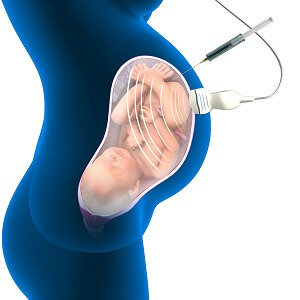Obstetrical care includes the the diagnosis, treatment, and follow-up care provided to women of reproductive age who are pregnant or who have recently delivered a baby (known as the post-partum phase). It also includes care and management of obstetric injuries - injuries that occur either during childbirth or soon after delivery.
Dr. Gomez is board certified by the American Board of Obstetrics and Gynecology and is committed to providing the most comprehensive care for women of all ages. Click on the below tabs to learn more about the various conditions and their treatment options.
-
What is a Prenatal Appointment?

A prenatal appointment is an appointment with your OB/GYN doctor to check on your health and assess the progress of your pregnancy. During the visit, you will be counseled on how to prepare properly for the labor and delivery of your baby. You can also ask questions to clear any doubts related to your pregnancy. Your partner, friend, or family member can accompany you to your prenatal appointments.
Know More -
Pre-Conception Planning

Preconception planning can be defined as getting ready for pregnancy. It helps you and your partner understand how to enhance your chances of a healthy pregnancy and prepare for the best possibility. A preconception appointment with your doctor is very important to ensure you have a healthy pregnancy.
Know More -
Pregnancy - Tests, Counselling and Planning

During a pre-pregnancy health assessment, your doctor reviews your medical history, reproductive history, diet, lifestyle and other habits, and performs a thorough physical examination. Your physician may order certain blood tests (full blood parameters, iron and ferritin levels) and urine tests (for sugar, protein, and infection) to check your health condition.
Know More -
Genetic Screening

Our genetic makeup (DNA, chromosomes, genes, and proteins) is what makes each of us unique. Many diseases are caused by changes or mutations in certain genes and chromosomes. Genetic screening tests help determine whether you are at an increased risk of having a baby with a genetic disorder.
Know More -
Obstetrical Care

Obstetrical care is the diagnosis, treatment, and follow-up care provided to women of reproductive age who are pregnant or who have recently delivered a baby (known as the post-partum phase). It also includes care and management of obstetric injuries - injuries that occur either during childbirth or soon after delivery.
Know More -
Fetal Monitoring

Fetal monitoring is the procedure used to assess the rate and rhythm of the fetal heart and determine the health of the fetus. It is generally recommended during late pregnancy and labor.
Know More -
Assisted Vaginal Birth

Birthing occurs by the coordinated and rhythmic contractions of the uterus to push your baby out of the womb. Sometimes, this process is not possible or becomes difficult, and requires external assistance to deliver your baby vaginally. Assisted vaginal birth is a procedure in which specially designed instruments are used to aid a vaginal delivery.
Know More -
Cesarean Section

Cesarean section, also called C-section, is a surgical procedure to give birth to a baby. It is a type of assisted birth procedure. It is a major surgery for pregnant women to deliver a fully developed baby from the mother’s womb via incisions in the abdomen and the uterus.
Know More -
Supervision of High-Risk Pregnancy

A high-risk pregnancy is a pregnancy that poses a threat to a woman before or during pregnancy, or after delivery. A high-risk pregnancy demands regular monitoring and special care of both the baby and mother throughout the pregnancy.
Know More -
Female Infertility Treatments

Female infertility treatments is the term used to denote the various medical approaches that are employed to treat women who have problems conceiving or difficulty getting pregnant. Female infertility treatments are offered by gynecologists and infertility specialists in dedicated clinics or hospitals.
Know More -
Robotic Treatment for Male Infertility

Male infertility is a significant cause of infertility in almost half of infertile couples. Over the last several decades, the treatment of infertility has advanced with the emergence of new assisted reproduction techniques like In-Vitro Fertilization (IVF), Intra-Cytoplasmic Sperm Injection (ICSCI), and microsurgery techniques including robotic surgery.
Know More -
Barrier Methods of Birth Control

Barrier methods of birth control are non-surgical methods to prevent pregnancy. They are called “barrier methods” as each uses a physical barrier to prevent sperm from reaching the egg. This prevents fertilization and the likelihood of a pregnancy. Some barrier methods also provide protection against sexually transmitted diseases (STDs).
Know More -
Oral Contraceptives or Birth Control Pills

Oral contraceptives also called birth control pills, are tablets taken by mouth to control pregnancy. They contain a specific dose of the female sex hormones estrogen and progestin, which are clinically proven to be effective in controlling pregnancy by bringing about physiological changes in your body.
Know More -
Birth Control Implant

A birth control implant is a long-lasting contraceptive device for females. It is a small flexible plastic tube that is inserted beneath the skin in your upper arm. After successful placement, the implant begins to release a fixed dose of birth control medications into your bloodstream which induce hormonal changes in the female body.
Know More -
Insertion & Removal of Implanon

Implanon is inserted by an experienced physician or healthcare professional under the skin of the non-dominant upper arm.
Know More -
Mirena

Mirena is a T-shaped hormonal Intra Uterine Device (IUD) that provides long-term contraception (birth control). It continuously releases a small amount of the hormone progestin in the uterus for about 5 years. Progestin thickens the cervical mucus making it difficult for the sperm to swim towards the egg and also suppresses ovulation (release of an egg from an ovary) preventing pregnancy.
Know More -
Nuvaring

Nuvaring is a type of hormonal birth control device. It is a small, clear and flexible plastic ring that is inserted into the vagina to prevent pregnancy by releasing hormones into your body. The ring stays in place for 3 weeks and then is removed to allow menstruation to occur. After menstruating one week, a new ring is inserted.
Know More -
Sterilization

Sterilization in women is a permanent form of birth control or contraception to prevent pregnancy. Sterilization works by blocking or sealing the fallopian tubes to prevent the eggs from reaching the sperm and getting fertilized.
Know More -
Laparoscopic Sterilization

Laparoscopic sterilization is a technique of tubal ligation to block or close the fallopian tubes, the pathway for sperms to reach eggs for fertilization. Fallopian tubes, located on either side of the uterus, pick up eggs released from the ovaries and transfer them to the uterus.
Know More -
Tubal Ligation

Tubal ligation is a permanent birth control method that involves the surgical blocking of the fallopian tubes, the region of fertilization.
Know More -
Tubal Reversal/Reconstructive Surgery

Tubal reversal after sterilization is a surgical procedure to restore fertility by restoring the normal functionality of the fallopian tubes that were blocked during sterilization. About 5-10% of women may require a reversal of sterilization, due to various reasons such as having a new partner and desire for additional children.
Know More -
Stages of Pregnancy

Pregnancy is a stage in a woman’s life when she begins to develop a new human life in her womb. A typical pregnancy lasts for about 40 weeks, beginning from the first day of your last period.
Know More -
Reducing Risks of Birth Defects

Birth defects are the structural or functional abnormalities that are present at birth. These defects occur while a baby is developing in the mother's body. Some of these are clinically obvious at birth, however, a few get diagnosed much later in life. Examples of birth defects include cleft lip, heart defects, and neural tube defects.
Know More -
Reducing Risks of Birth Defects

Birth defects are the structural or functional abnormalities that are present at birth. These defects occur while a baby is developing in the mother's body. Some of these are clinically obvious at birth, however, a few get diagnosed much later in life. Examples of birth defects include cleft lip, heart defects, and neural tube defects.
Know More -
Nutrition During Pregnancy

The food you consume during pregnancy helps to provide sufficient nutrients for yourself as well as your growing baby. A well-balanced nutritious diet during pregnancy keeps you and your baby healthy and is required for your baby’s overall growth and development.
Know More -
Early Pregnancy Complications

Pregnancy is an exciting time for women, but complications may develop sometimes even in healthy women. Early pregnancy complications are the health problems that occur during the early period or first few months (first trimester) of pregnancy.
Know More -
Early Preterm Birth

A normal pregnancy is of about 40 weeks duration. A baby born between weeks 32 and 37 of pregnancy is a preterm baby. An early preterm birth occurs when a baby is born before 32 weeks. Early preterm babies often have serious, long-term health problems.
Know More -
Ectopic Pregnancy

Ectopic pregnancy is a pregnancy that is not in the usual place within the uterus but develops outside the uterus (womb). The most commonplace that ectopic pregnancy occurs is in one of the fallopian tubes (tubes that carry eggs from the ovaries to the uterus).
Know More -
Infertility

The inability of women to conceive after a year of having unprotected sex, or the inability of women to sustain pregnancy is known as infertility.
Know More -
Male Infertility

Male infertility is a common reproductive problem affecting men, where the male is unable to contribute to a pregnancy. When couples are not able to conceive even after having unprotected sex for over a year, it is important for both partners to be examined by their physician. Up to 1 out of 3 infertility cases are linked partly to issues with the male partner.
Know More -
Multiple Pregnancy

A pregnancy with more than one baby growing inside the womb at the same time is called a multiple pregnancy.
Know More -
Obstetric Injuries

Obstetrics is the branch of science that deals with the study of childbirth and the changes and complications associated with it. Obstetric injury refers to any injury that occurs in women either during childbirth or soon after delivery.
Know More





























